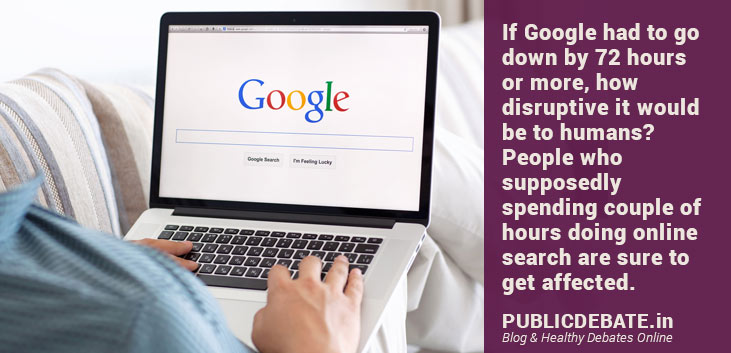Are we too much dependent on Google for answers?

If Google had to go down by 72 hours or more, how disruptive it would be to humans? People who supposedly spending couple of hours doing online search are sure to get affected.
Do you remember when we struggle hard to remember the name of a certain actress, kind of car or a historical event that took place?
Unfortunately, we don’t allow our brain to recall with internet, answers are at the fingertips.
Though the access of acquiring information in the modern world have made lives easy in so many ways, it is also changing how our brain works and makes an attempt to processes information.
In one way we are dependent on Google to store longtime knowledge instead of brains.
What is Google doing to your brain?
Internet is changing the way we think. Internet has changed the way our brain work. Depending online may turn us into mere decoders, rather than ‘deep readers’ distracting the critical thinking.
The web is a distracting aspect; it is more to do than reading. We may also lose cognitive skills depending on web information.
With a large number of people depending on Google, we remember less information. We rely on Google to store the smallest of the smallest information.
Frequent internet users show twice the activity of short-term memory. Basically, our brain is good at coding information this connection becomes stronger when we experience it.
The more we use Google, very less we are to retain what we see.
Our brain has the power to store and recall memories. It has the ability to think critically. We need some unique memories to interact with our brain.
If we are relying on Google to store knowledge we may lose an important part of our identity. One can’t rely on artificial intelligence all the time.
For example Artificial intelligence can’t replace certain things say values, emotions and critical thinking.
Extended Mind- How Google helps us?
A study by UCLA researcher, found that searching information on internet can activate the brain region better than reading a book.
But it only did for people who are experienced computer users. In one way you need to identify relevant results and make a judgment on the content reliability.
This attributes the disparity to extra cognitive process required to search information on web.
It’s fairly good news for millennia’s- we always knew we were smarter than our parents, right? Pretty much the question isn’t about the internet changing the way we thing, but how we think.
The question is internet usage changing your brain in some beneficial way? Brian is malleable and adapts to its atmosphere.
Now that internet is highly available we have to remember the location of the information. It kind of helps to think more efficiently if we don’t remember so much.
The bad news is that we might lose the ability to store the knowledge on problem solving and creativity skills.
There are many stories both positive and negative.
In one way Google is not actually making us stupid but changing what intelligence is. It is more becoming more about knowing how to access and connect external information.
So far it’s good to maintain a healthy balance. It’s so far making us mentally demanding to access information and even more. Maintain both the online reading and offline reading skills- don’t feel bad about you.
You just have to keep exercising some different brain muscles.
Source:http://scholar.harvard.edu/files/dwegner/files/sparrow_et_al._2011.pdf
https://www.psychologytoday.com/files/attachments/5230/136.pdf
http://www.idgconnect.com/abstract/9263/what-google-doing-brain










